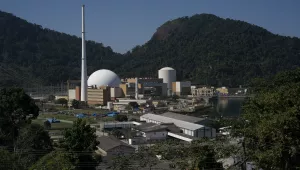BEIRUT—The court sessions of the Special Tribunal for Lebanon (STL) that open in The Hague Thursday to try the five people accused of being involved in the killing of the late Lebanese Prime Minister Rafik Hariri represent a potentially significant moment in the long and ugly—and continuing—history of political violence in the modern Middle East. The STL has had a complex and contested history since its establishment in 2006, soon after the Hariri assassination, with both those who support and oppose it offering arguments that need to be considered seriously.
Any discussion of the STL should recognize and assess separately its three main dimensions—the political, the judicial, and the technical—before reaching a conclusion on whether it is a fine endeavor that deserves our support or a dangerous political adventure that we should bury. The final verdict on the STL must emerge after the trials are held, the evidence and arguments presented, witnesses questioned, and public opinion heard on all these issues.
All the discussions about the STL to date essentially have been political disputes, which are fascinating but peripheral. They reflect the well known views of the two main ideological camps in Lebanon, the March 14 parties close to Saad Hariri, the Future Movement, Saudi Arabia and the United States, and the March 8 parties close to Hizbullah, Syria, Iran and a constellation of allies in and outside Lebanon. These two camps will battle in their sleep over the weather and restaurant menus and anything else that moves, speaks or reflects light—so their dispute about the purpose, legitimacy and efficacy of the STL is predictable and unimpressive.
More significant in the long run is the judicial and legal performance of the STL, which should only be judged on the basis of the quality of the judicial proceedings and the credibility of the evidence and arguments by both sides. Whatever the political sentiments behind those who created or oppose it, the STL matters because it seeks to use internationally credible legal mechanisms to fairly try and hold accountable those who have been indicted for murders. Lebanon on its own has never been able to do this, despite the many assassinations and bombings over the years, perpetrated by Lebanese or foreign parties.
The world stepped in to redress Lebanon’s own lack of political and technical capacity to hold accountable and try those who assassinate public figures or bomb and terrorize society at large (and to be fair, Lebanon is not the sole weak party in this respect; no Arab country has carried out sustained and credible legal proceedings to stop assassinations and political violence, other than occasionally imprisoning terrorists or people accused of being terrorists, usually in very deficient legal proceedings with low credibility). The fact that a unanimous UN Security Council decision established the STL and the associated investigations is a powerful statement about the unanimous will in Lebanon and abroad to determine who killed Hariri and to hold them accountable.
Whether this process succeeds will depend largely on the quality of the trial proceedings that start this week in The Hague. The technical quality of the process over the past eight years or so has been mixed, with both sloppy and impressive conduct by the professional staff in charge of it. The politics of the STL are equally contentious, and Hizbullah in particular has provided evidence that aims to discredit the whole process as an American-Israeli-guided political adventure that seeks mainly to punish and constrain Syria and Hizbullah. That evidence is intriguing in suggesting that Israel killed Hariri, but it remains mostly unconvincing on its own. The prosecution’s evidence that relies heavily on telephone call logs to show that five individuals associated with Hizbullah are the ones who planned and carried out the killing is equally fascinating, but also inconclusive at first sight.
This is why the proceedings themselves are so important, because they will allow both sides to lay out their respective cases in more detail, with witnesses and cross-examinations, and the results should clarify which side has the more compelling case. This is the moment to monitor the STL in-court deliberations carefully, rather than to waste time on more political accusations. If the trial is successful in unambiguously identifying those who killed Hariri and punishing them accordingly, this would be a historic advance in the heretofore sterile record of ending the impunity of political assassins in the Arab world.
It will be important for any subsequent similar endeavors—whether purely national, or international as in this case—to apply the same high judicial standards to investigations and trials of other acts of political violence in Lebanon and other Arab countries. That will be a hard hill to climb, but an absolutely imperative one if the rule of law is ever to take hold in our lands and replace the law of the jungle and the gun.
Rami G. Khouri is Editor-at-large of The Daily Star, and Director of the Issam Fares Institute for Public Policy and International Affairs at the American University of Beirut, in Beirut, Lebanon. You can follow him @ramikhouri.
Khouri, Rami. “Welcoming an Historic Day in Court.” Agence Global, January 15, 2014





